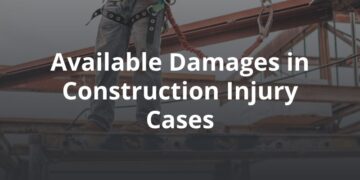Getting into a motorcycle accident can turn your life upside-down. The more you know about your legal rights, the recovery process and Texas’s liability laws, the likelier it is that you will receive the financial compensation you deserve for your motorcycle accident. Use this guide for basic information about the legal process involved in a motorcycle accident case in Texas.
Motorcycle Accident Facts and Statistics
According to the Texas Department of Transportation, 562 motorcyclists lost their lives in fatal accidents in 2022, representing an 8 percent increase from the year before. Nationwide, 5,932 motorcyclists were killed in accidents in 2021 – the highest number since 1975.
Common injuries suffered by motorcyclists in accidents include:
- Biker’s arm (nerve damage)
- Broken bones
- Dental injuries
- Eye injuries
- Facial injuries
- Head and skull injuries
- Injury to the lower extremities
- Internal injuries
- Organ failure
- Road rash
- Soft-tissue injuries
- Spinal cord injuries
- Traumatic brain injuries
In 2021, motorcyclists were about 24 times more likely than passenger vehicle occupants to die in automobile accidents per vehicle miles traveled in the U.S. Motorcyclists face a higher risk of catastrophic injuries and death due to a lack of injury protection.
Steps to Take After a Motorcycle Accident
If you get involved in a motorcycle accident in Texas, it is important to take the right steps to pursue justice and financial compensation for your losses.
Protect yourself with the following actions:
- Stop at the scene of the crash and check for injuries. Check yourself and everyone else involved in the crash for injuries and call for help, if necessary.
- Move your motorcycle out of traffic. If you are able to do so, move your disabled motorcycle to the side of the road to prevent further collisions while you check for injuries.
- Seek medical attention immediately, if needed. If you or anyone else involved in the crash has been injured, request paramedics without delay.
- Report the motorcycle accident to the police. Call 911 from the scene of the crash to report the motorcycle accident immediately. Do not admit fault.
- Exchange information. Ask for the driver’s insurance information, address and full name. Avoid discussing fault with the driver.
- Document everything. Give your side of the story to the police, take pictures of the motorcycle crash scene before you leave and gather eyewitness information.
- Keep up with medical care. Follow your doctor’s treatment recommendations while you heal from your injuries. Obtain copies of your medical records for insurance purposes.
- File an insurance claim. Report the accident to your own insurance company first. They will help you seek compensation from the at-fault party.
- Do not rush into a fast settlement. The first settlement offered by an insurance company is often intentionally set low. Do not sign anything until you’ve spoken with an attorney.
- Contact an experienced motorcycle accident lawyer. Consult with a personal injury attorney in Austin to better understand your rights.
You can contact a motorcycle accident lawyer as early on in the recovery process as you wish for tailored legal advice and assistance.
Liability for Motorcycle Accident Damages in Texas
Texas is a fault state when it comes to motorcycle accident insurance claims. Under this insurance law, the driver or individual most at fault for causing the accident is held financially responsible, meaning his or her insurance must pay for related property damage and medical costs.
In a no-fault state, on the other hand, all parties seek compensation from their own insurance providers, regardless of fault. Texas’s fault law requires an injured party to determine who caused the crash before he or she can file an insurance claim.
Liability, or legal accountability, for a motorcycle accident could go to a motor vehicle operator for negligence or the failure to act with reasonable care. Examples include speeding, reckless driving, driving while intoxicated, texting and driving, aggressive driving, and failing to yield.
However, liability could also go to a third party. An example is a government entity in Texas for failing to repair a dangerous road defect that causes a motorcycle crash, such as a pothole. Another possibility is the manufacturer of a defective motorcycle part that results in an accident.
How to Prove a Motorcycle Accident Case
When you file a motorcycle accident claim in Texas, you are given the burden of proof as the plaintiff or injured party. This means you or your attorney must prove that the accused party (defendant) is at fault for your crash.
The burden of proof is a preponderance of the evidence, meaning proof that the defendant more likely than not is at fault for causing the accident. Your attorney can help you gather evidence to meet this evidentiary standard, such as accident reports and expert testimony.
Most motorcycle accident cases in Texas are based on the legal doctrine of negligence. Proving negligence requires clear and convincing evidence that the defendant owed the plaintiff a duty of care, breached or fell short of this duty of care, and caused the motorcycle accident.
The Legal Process for a Motorcycle Accident Case
If you file a claim with an at-fault driver’s insurance company and they accept liability, an insurance claims adjuster will offer you a settlement. This is a specific amount of money given to you in exchange for the release of any further liability for your crash-related damages.
You have the power to negotiate the value of a settlement for a higher amount if the initial offer is too low for the severity of your injuries and losses. You may need to hire an Austin motorcycle accident attorney to take over these negotiations on your behalf and achieve fair compensation.
It is especially important to hire an attorney if an insurance company rejects your claim, refuses to offer a reasonable settlement or attempts to blame you for the crash. These are case complications that may require assistance from a highly experienced motorcycle accident lawyer.
Types of Financial Compensation Available
A successful motorcycle accident claim in Texas could result in financial compensation being paid by one or multiple parties for your pecuniary (economic) and nonpecuniary (noneconomic) damages.
These may include:
- Past and future medical bills
- Property repairs
- Pain and suffering
- Lost wages
- Lost capacity to earn
- Loss of enjoyment of life
If you tragically lost a loved one in a fatal motorcycle accident, your family may be able to recover compensation for costs such as funeral and burial expenses. A personal injury lawyer can help you seek the compensation you deserve for a Texas motorcycle accident.
For more information about motorcycle accident laws in Texas, contact FVF Law for a free, no-obligation case consultation. Our personal injury lawyers have over 100 years of combined legal experience. Call (512) 865-5941.







